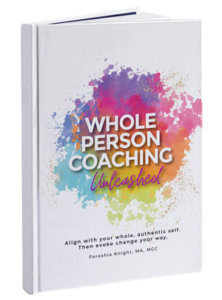How to deliver more value than your coaching clients imagined possible.
You’re interested in coaching. Yet there’s part of you that wonders: will I be good at it?
Like most of us, you possess expertise in an area you want to help others with. From leading organizations, losing weight, and cultivating positive relationships to effective communication, life after divorce, and finding your own spiritual path, you have valuable knowledge to share.
But you want more.
Maybe you’re thinking about success and the next generation?
Perhaps you want to push yourself to develop and stay on the edge of your field?
Sometimes you just want to share what you’ve learned with others, so they can get as much out of what you do as you have?
Or you simply want to help others by contributing your best.
Regardless of your motivation, the end result is the same. You are called to coaching. Now suddenly, you find yourself in territory that is new and unknown.
What do you worry about most when you think about becoming a coach and helping others? If you’re like our other new students, one concern seems to always rise above the rest…
Many of us worry whether our clients will get the value they paid for.
As a new coach in the early 2000s, I always felt a sense of internalized urgency during my coaching sessions. I wanted to get every client to their stated destination during the session (right then and there!).
Once I was clear on what my client wanted to achieve, it was “game on.” I worked tirelessly to generate the positive momentum they sought.
My motivation: I wanted to make sure my clients felt good about their choice to invest in me as their coach. After all, with so many untrained “coaches” in the world, I needed proof that my process really worked. I was looking for certainty that I wasn’t just relying on my own experience as a guide.
This brought on recurring feelings of nervousness, physical as well as emotional. I remember very distinctly thinking…
What if I can’t help my clients achieve the results they’re seeking? What if they (or I) get stuck in the process? What if they fire me or don’t come back?
I didn’t want to be “that coach.”
This was further enhanced by a conversation I had at a Business Network International (BNI) meeting. When asked by one of the members what I did, I proudly responded, “I’m a coach.” That’s when I got to hear all about “some coach” who had done little more than take her money.
I learned later that the person she was referring to wasn’t even operating as a coach. Instead, this individual was simply leveraging what had worked for them in the hope that others could achieve similar results.
Admirable, yet that “coach” missed the mark. They failed to consider that the client might need a different approach to get to where they wanted to be.
More importantly, that coach was likely addressing the wrong issues. They weren’t trained to recognize the invisible factors that hold people back. Without that insight, it would have been impossible to alleviate the surface symptoms, let alone remove those barriers once and for all.
Perhaps you can relate? You want to bring your best into coaching and generate results too.
Well, here’s how…
Get recognized for who you are and what you offer with these essential traits
Trait #1: Build your coaching approach on a proven method that allows you to bring your whole self into the process.
When someone entrusts their faith and finances to you, that’s a gift. You want to ensure they receive the value they deserve.
This is why training to become a Professional Whole Person Coach and earning your ICF credential has worked so well for our graduates. They’ve gained a rock-solid system that allowed them to evoke change – their way – by bringing their whole self into the coaching approach.
This system is what establishes your credibility. It works to help clients and prospective employers recognize and trust that you can deliver the results you’re promising.
But that’s only part of it…
A reliable system and process to follow certainly provide an incredible foundation on which to build your services. But your clients are not linear. They’re fluid, and constantly evolving as they learn, grow, and change from moment to moment.
This means you too must become an instrument of change. Your ability to adapt in the moment separates you from the countless others offering coaching services. It makes you the go-to resource for holistic improvement.
In fact, this is so important, it deserves more discussion. Which takes us to the next trait…
Trait #2: Be an instrument of change: creative, adaptive, agile.
Clients often arrive on your proverbial doorstep because they can’t figure out what’s preventing them from achieving the things they want in life or career.
Yet even within the same niche or industry, no two clients are exactly alike.
This is why our Whole Person Coaching method equips you with customizable tools and techniques. They enhance your ability to shift and adapt your process as you tailor them to each client.
Your shiftability makes your coaching approach unique. It also empowers you to cultivate a highly customized process based on who you are working with. No cookie cutter approaches here.
This is the secret to becoming an instrument of change.
You lead with the comfort of something to fall back on (the WPC system), while remaining intuitive and innovative in your process.
There is one final trait you must develop. And trust me, this is a big part of my personal mission…
Trait #3: Step out of the shadow of doubt: show up whole and confident.
Think about how it feels to do something when you’re calm and confident. Whether you identify as an introvert or an extrovert, we are most successful when we’re self-assured in our abilities and our capacity to create the results expected of us.
This ability usually follows a certain amount of personal preparation and quality training. So, here we have a critical question: what’s behind the training program you’re considering?
The Whole Person Coaching method is not theory. Its foundational components are the leading principles of neuroscience, psychology, and personal development. Unlike so many who offer “coaching” services derived from their personal philosophy, Whole Person Coaching draws on science to produce outcomes.
The result is a level of confidence that separates Whole Person Coaches from all others.
As you enter into the business of change, you too are undertaking a significant life change. Your first steps take you into a new way of working with people. But the very first step involves a new way of navigating your own life and getting past your roadblocks.
As a coach, you are your first client. Along with the tools you learn, you also rely heavily on support – both mentorship and that of peers. I consider this the second half of the confidence equation.
In the same way that you evaluate the legitimacy of a coaching model, you must also analyze the quality of its community. How many graduates are active in the community? Does it have members who share your goals and area of expertise (or desired expertise)? How long does their support last?
Look for likeminded individuals who are just as passionate about what they’re doing as you are. Quality programs are also those that feature a change master. These individuals specialize in helping you break through your own barriers and position you to be at the top of your game.
All of this adds up to you becoming not merely a good coach, but a great one who is sought after for the value and exponential results you provide.
Calm and confident, you are unshakable in who you are and unstoppable in accomplishing what matters most to you!
Summary
The traits detailed above are the secret, my friend, to delivering more value than what your clients paid for. The concepts seem simple enough, yet they take a substantial amount of work to become second-nature.
That’s why we always say: you are your first client.
Once you become whole and grounded in who you are, you’re capable of instilling the same agility and confidence in every life you touch. Your clients leave with their goals accomplished, and often a whole lot more.
More importantly, they come to know themselves in a way that allows them to be who they truly are at their very best. That’s something that will impact them for the rest of their lives.
The ability to deliver that level of change is the surest path to becoming highly sought after for the skills and expertise you possess.



